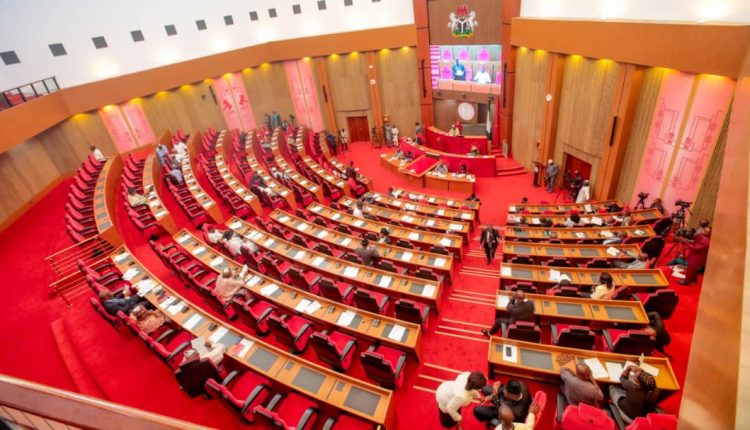MOVE TO GRANT SENATE PRESIDING OFFICERS AUTOMATIC RETURN TO THEIR POSTS IF REELECTED SUFFERS SETBACK
A major attempt to alter the Senate Standing Orders widely interpreted as a move to strengthen the eligibility of incumbent presiding officers to seamlessly return to the same office in the next Assembly suffered a dramatic setback on Tuesday after a pushback and procedural concerns raised on the floor.
The proposed amendments, sponsored by Senate Leader Michael Opeyemi Bamidele (Ekiti Central), sought to overhaul several sections of the 2023 Standing Orders. But the swift resistance it encountered forced the Senate President, Godswill Akpabio, to abruptly suspend deliberations, plunging the chamber into a rare moment of procedural deadlock.
Presenting the motion titled “Amendment of the Standing Orders of the Senate 2023 to Accommodate New Committees and Enhance Legislative Practice,” Sen. Bamidele argued that national changes, new commissions, and evolving governance demands had made updates to Senate rules inevitable.
Among the long list of proposed changes, the most contentious were:
1. Allowing Senators-elect to vote for Presiding Officers BEFORE taking oath
This would permit incoming lawmakers to elect the Senate President and Deputy Senate President even before being sworn in.
2. Mandatory Prior Senate Experience for Presiding Officers
The amendment required that anyone contesting for Senate President or Deputy must have served at least one four-year term.
3. Strict Ranking Rules for Presiding Officer Elections
The revised ranking sequence placed former presiding officers first, then returning senators, then former House members, with first-timers coming last.
As soon as Bamidele concluded the reading, several hands shot up across the chamber.
Former Gombe Governor, Senator Danjuma Goje, was first recognised.
“Mr Senate President, I oppose the amendment. I propose that we remove 1, 2 and 3 entirely. We can start from number four and go down to number six.”
His objection hit at the heart of the proposals those tied directly to qualification and ranking for the Senate Presidency.
Next came a crucial intervention from the Minority Leader, Senator Abba Moro, who invoked Order 109 of the Senate Rule Book.
Reading from the rule, Moro reminded colleagues that:
Any proposed amendment must first be formally submitted to the Senate President. It must be printed and circulated within seven working days. It must then appear on the Order Paper before deliberations. If this process is not followed, the Senate must decide whether to consider or reject the proposal by simple majority vote
He then asked; “Sir, have we honoured this rule? Otherwise, we should tarry a little bit and follow due process.”
Responding to the rising tension, Senate President Akpabio acknowledged the growing confusion, particularly on the controversial ranking clause.
He argued that ranking based on number of times re-elected could unfairly predetermine leadership.
“Number four means nobody will be Senate President if someone newly elected is the party’s candidate. Even number four should go. Senator Yau, with number four, you automatically become Senate President because you are a landlord here.”
Turning to Senator Aliyu Wamakko, he added:
“Senator Wamakko, we need to rephrase this. As written, senators elected from 1999 will have an advantage.”
The chamber grew more agitated as senators murmured and exchanged gestures.
After reiterating Moro’s citation of Order 109, Akpabio made the final pronouncement:
“If we have not followed this process, then what we are engaging in is an exercise in futility. The point of order is upheld.” He then struck the gavel twice suspending further debate on the amendments.
The move effectively laid to rest the momentum behind the proposed alterations, marking a clear setback for proponents of the changes.
The Senate had previously amended its rules in October 2023, barring first-term senators from contesting presiding officer positions a change widely seen as blocking the ambition of Senator Abdulaziz Yari, who lost the Senate Presidency contest to Akpabio.
The fresh amendment was therefore perceived by many as another manoeuvre to shape leadership outcomes for future Assemblies.
Only days ago, the Senate leadership debunked reports of any plan to impeach Akpabio, with Senate Leader Bamidele calling such claims a “misrepresentation.”
Despite the setback the Senate’s Constitution does not state how many times a Senate President can seek re-election.
According to the Senate Rule Book there is no term limit. The only restriction is the October 2023 amendment requiring that a contestant must have served at least one prior four-year term.
https://thesun.ng/move-to-legitimise-return-of-senate-president-deputy-suffers-setback-at-senate/


